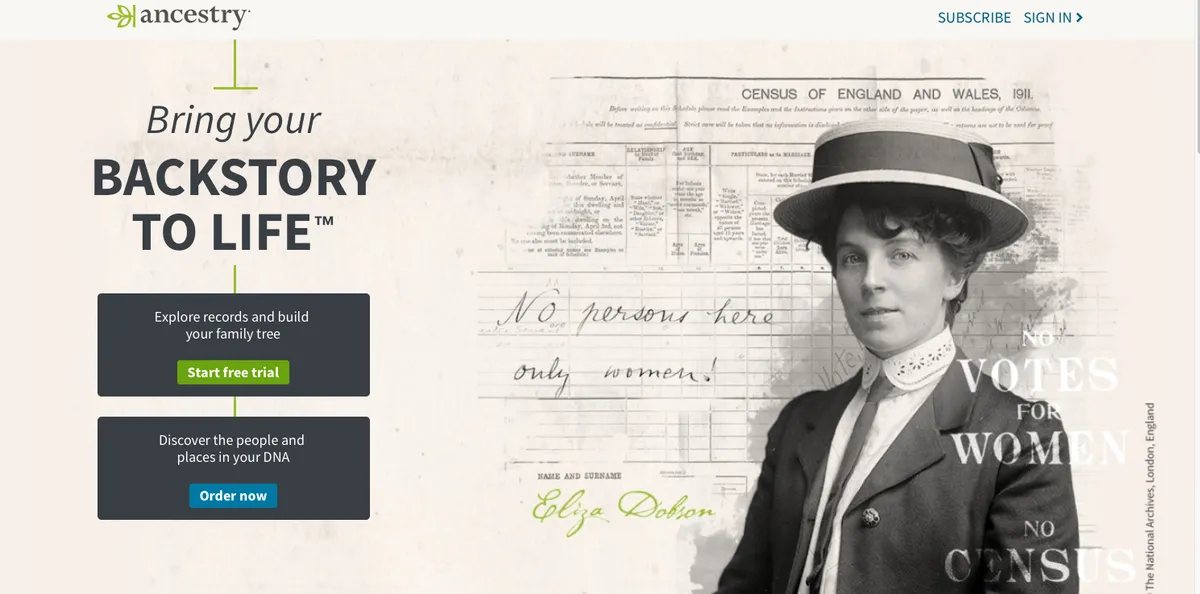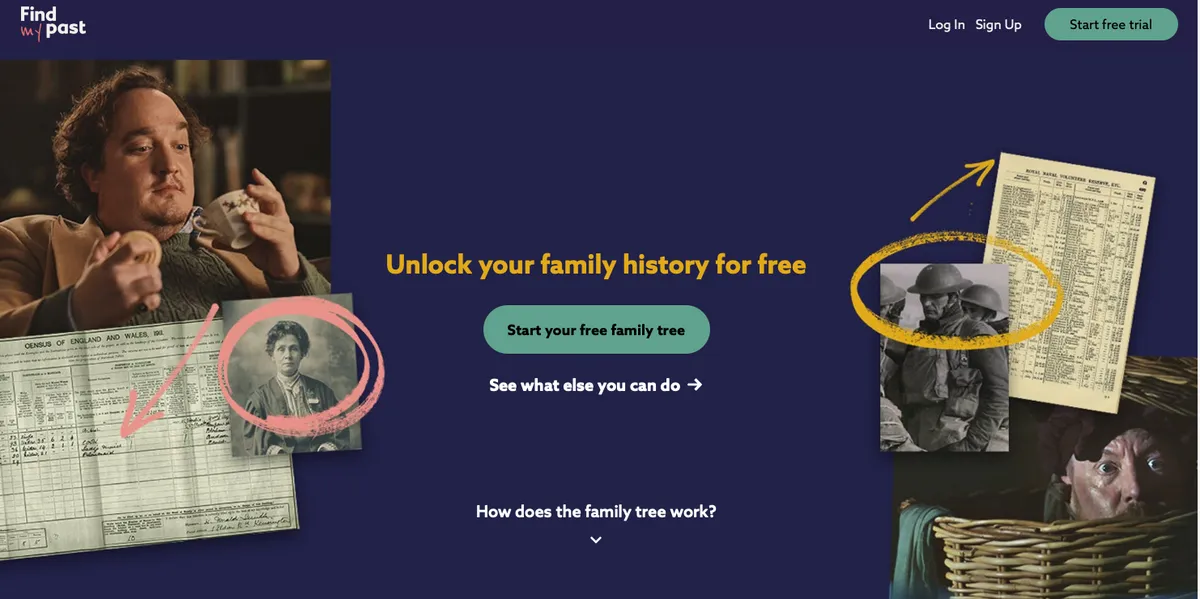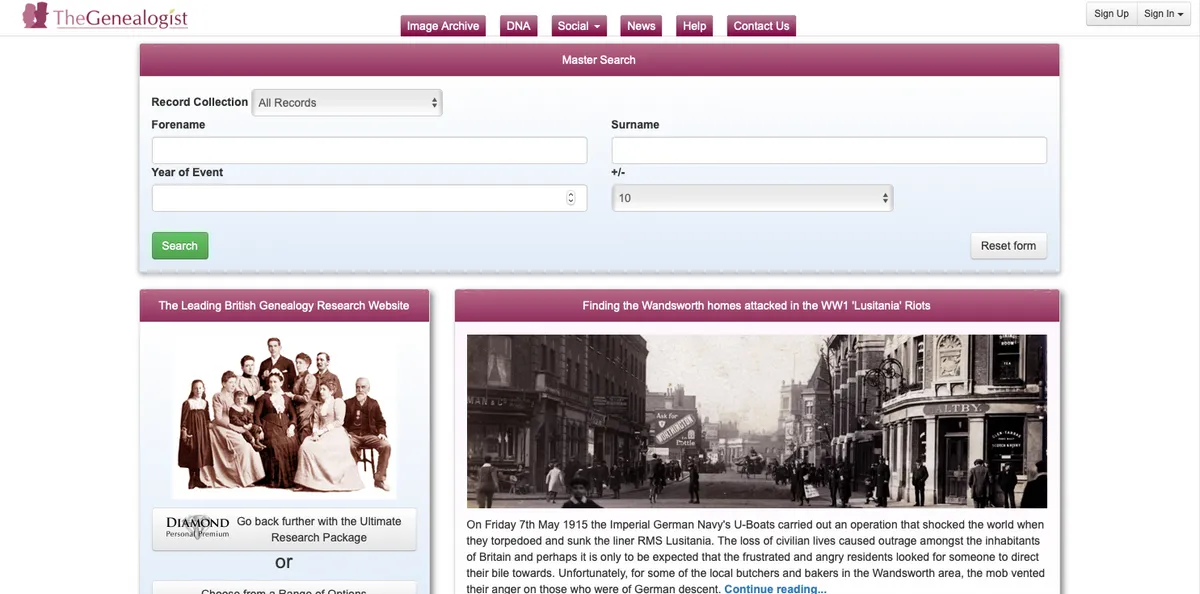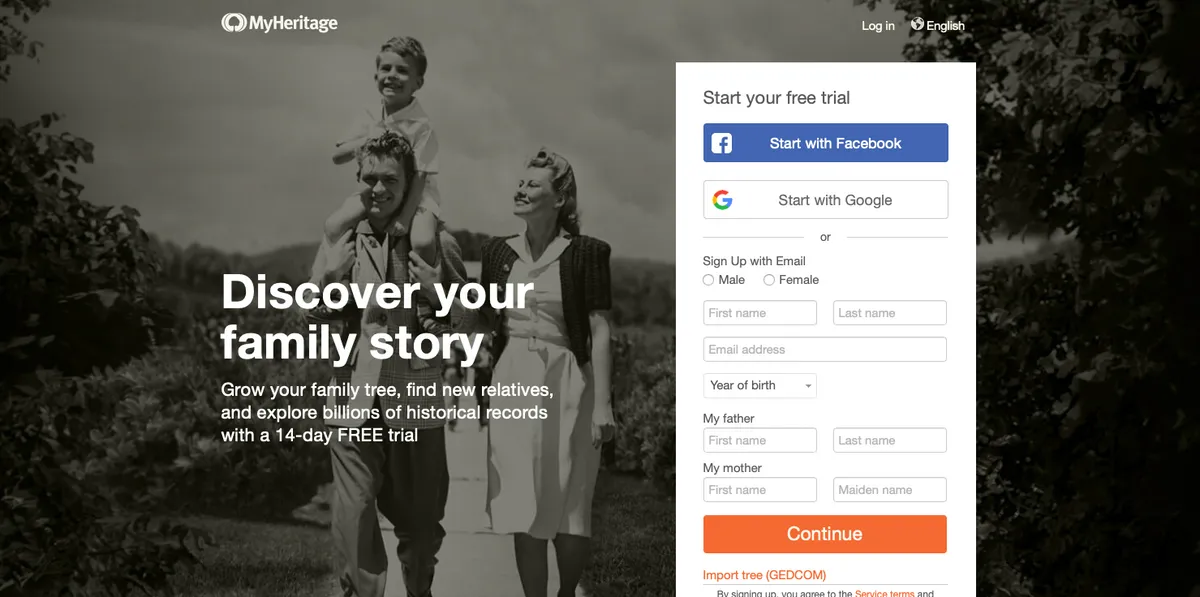The Internet has allowed thousands of people to discover their family history, thanks to the growing number of commercial family history websites that have digitised millions of historic records from around the world. But this now presents a challenge - if you only want to subscribe to one website, how do you decide which is the best family history website for you?
Ancestry, Findmypast, MyHeritage and TheGenealogist are four of the biggest English and Welsh family history websites (with a good number of Scottish records as well). They all offer the General Register Office birth, marriage and death indexes back to 1837 and census records from 1841 to 1911 - the essential datasets that form the backbone of family history. The 1921 census is now also available on both Findmypast and Ancestry. They also all offer the 1939 Register, although only Ancestry and Findmypast also include images with their index. Welsh and Norfolk parish register collections are also held across all four websites, Surrey parish registers are now available on both Ancestry and Findmypast and the nonconformist collections from The National Archives are available via Ancestry, Findmypast and TheGenealogist.
It helps to know which parts of the UK you are most likely to be researching as Ancestry and Findmypast in particular have exclusive relationships with specific archives and local authorities. This usually means that images to crucial parish registers, as well as other records such as land tax, prison and quarter session records may only be available from a website that has a relationship with that specific local authority. This can sometimes be problematic. Ancestry has Birmingham records, for example, while neighbouring Staffordshire records are on Findmypast.
What is the best family history website for UK research?
Ancestry

Of the four main family history websites we are comparing, Ancestry has been going for the longest and is the market leader. It is also available for free from many libraries and archives so if you are watching the pennies, you can access most of this data for free if you are willing to visit a library. Some of their datasets and features are also available to view for free from a home computer. If you are researching a lot of family in London, then Ancestry is probably the best option for you.
Pros
- Excellent family tree builder that will connect you with other people researching the same family members. Also offers ‘hints’ for records on the site that may relate to your research.
- Its exclusive relationship with some archives make it an essential go-to site if you are researching family in any of the following areas: Bedfordshire (although parish registers have not yet been added), Bristol, Derbyshire, Glamorgan, Gloucestershire, Hampshire, Lancashire, Liverpool, London, North Yorkshire, Oxfordshire, Surrey, Warwickshire and West Yorkshire.
- It has a wide range of records including electoral registers, land tax, military, probate, occupational records and passenger lists.
- The site also has a huge collection of overseas records that you can link to your ancestors if you take out an international subscription.
Cons
- You have to pay extra for overseas records and some of their military records, such as the First World War pension cards, are held on a separate site, Fold3, for which there is an additional charge.
- The site has so many records it can be confusing to use for beginners and its higher price reflects the amount of material the site holds but may be more than some researchers require.
How much does Ancestry cost?
The following prices are Auto Renewing (Direct Debit prices) although they can be cancelled at any time.
- Ancestry Essentials (includes census and GRO index but not much else): 1 month £10.99; 6 months £54.99
- Ancestry Premium (all UK & Ireland records - best for most UK researchers): 1 month £13.99; 6 months £69.99
- Ancestry Worldwide (includes over 3 billion international records): 1 month £19.99; 6 months £99.99
Findmypast

Findmypast markets itself as the best family history website for British research and there’s certainly a lot going for it. Like Ancestry it holds all the main records that family historians rely on such as census and birth, marriage and death records and there is quite a lot of overlap between the two sites. For example they both offer First World War records, and parish registers for certain areas such as Wales or Norfolk are available across both sites. However, there are also some major differences.
Pros
- Perhaps the biggest plus for Findmypast is its relationship with the British Newspaper Archive, with access to over 85 million historic newspaper pages.
- Like Ancestry it has exclusive relationships with a number of archives making it the essential go-to site for places like: Surrey, West Devon, East and North Yorkshire and Staffordshire.
- An excellent Catholic collection covering the UK and beyond.
- Has a strong electoral register collection due to a partnership with the British Library.
- Includes a number of unique indexes provided by family history societies across the UK
Cons
- The family tree builder has, until recently, been treated as an add-on rather than central to people’s research and so the number of Findmypast subscribers who keep their tree on the site is far lower than Ancestry, meaning you are less likely to connect with other family historians via your tree here.
How much does Findmypast cost?
The following prices are Auto Renewing (Direct Debit prices) although they can be cancelled at any time.
- Family Tree: 1 month £9.99
- Everything: 1 month £24.95; 3 months £59.99; 1 year £199.99
TheGenealogist

This independently owned British company has plenty to offer British researchers including the staples of census and GRO indexes as well as some large datasets that are also held by the other main providers such as Norfolk and Welsh parish registers and nonconformist registers. The website also has some great exclusive datasets, including a growing collection of memorial headstone images. One of the key features of TheGenealogist is its map search (Map Explorer) which adds pins on historic OS maps to show records. It is still a work in progress, but more and more map-based records including land tax and tithe records are being added.
Pros
- TheGenealogist has an excellent, easy-to-use, search facility with good flexibility for searching census and other records.
- The main exclusive collections here are tithe maps and the 1910 Lloyd George Domesday Survey. These are incorporated into the excellent map searching facility on the website.
- The site is a good option for those researching their house history or street with map searches and an easy to use address search.
- The site also has some exclusive military records including cards recording Distinguished Conduct Medal awards and a full searchable index for Second World War RAF Operation Record Books (although the RAF ORB records are currently being added to Ancestry). It is also has a good collection of First World War newspapers and publications.
Cons
- Although this is a cheaper option, the site holds fewer records than its main competitors. Look out for special offers and discounts. Its Starter package is good value for beginners.
- Some of its collections including the 1939 Register do not come with images of the original so you have to trust the transcription you are given.
How much does TheGenealogist cost?
The following prices are Auto Renewing (Direct Debit prices) although they can be cancelled at any time.
- Starter (includes census and GRO index as well as a large number of reference books and landowner records): 3 months £14.95; 6 months £28.95; 12 months £54.95
- Gold (includes nonconformist, military and some parish records): 3 months £38.95; 6 months £58.95; 12 months £98.95
- Diamond (all parish records and headstones plus Tithe and Lloyd George records and any new records): 12 months £139.95
MyHeritage

This Israeli-owned family history website is a late-comer to British records, focussing previously on the US market. Its previous pricing coupled with a lack of UK material made it unattractive to a British audience, but it has recently upped its game adding large datasets such as the 1939 Register (although, as with TheGenealogist, this comes without images) and Scottish census records up to 1901. MyHeritage has also successfully marketed its DNA test in the UK which has in turn raised awareness of the company and increased its share of the market.
Pros
- Excellent Smart Matches technology that compares your tree to others and enables you to benefit from the research of others.
- Good international record collection including old newspapers and immigration records with impressively accurate ‘hint’ algorithm included with their ‘Complete’ subscription package.
- Useful for anyone who doesn’t want to spend much time on their family history research and is happy to trust the research of others as it has an ‘Instant Discoveries’ feature that adds branches to your tree at the click of a button using an algorithm.
Cons
- Confusing pricing structure where some options do not include access to records (see below).
- Expensive for anyone just looking for UK family.
- No notable exclusive UK collections
How much does MyHeritage cost?
The following prices are Auto Renewing (Direct Debit prices) although they can be cancelled at any time.
- Premium (family tree up to 2,500 people plus Smart Matches but no records): 12 months £89 (1st year £59)
- PremiumPlus (unlimited family tree plus Instant Discoveries but no records): 12 months £169 (1st year £109)
- Data (access to data but not family tree features): 12 months £129 (1st year £79)
- Complete (all family tree features plus all data): 12 months £229 (1st year £139)
How to choose the best family history website for you
1. Don't rush
The first place to look is free genealogy websites such as FreeBMD (and its sister sites FreeREG and FreeCEN) and FamilySearch, which have a great range of records available for free. You may not need a subscription until you've really got stuck into your research, and by then you may have a clearer idea of which family history website is best for you.
2. Visit your library
Some local archives and libraries provide free access to Ancestry Library Edition and some now also offer access to Findmypast as well now.
3. Go further afield
The National Archives in London and the National Library of Wales in Aberystwyth let visitors use most family history websites for free on-site.
4. Take advantage of ‘try before you buy’
All four leading family history websites offer 14-day free trial memberships for newcomers. You will have to give your credit card details, so remember to cancel before the payment period kicks in automatically if you’re not ready to commit!
5. See whether it covers your region
Many family history websites have agreements to digitise records such as parish registers and workhouse records from county archives, so it's worth checking to see which website covers the areas you're interested in. If your family mostly comes from London, Gloucestershire or West Yorkshire, for example, then you may want to consider signing up to Ancestry, but if your family came from Kent, Devonshire or Leicestershire then Findmypast might be more suitable.
6. Check the collections
Don't just check regional differences, as each family history website has rights to different unique collections that may be of interest to you. For example, TheGenealogist has tithe maps, Findmypast has a vast collection of old newspapers via its partnership with the British Newspaper Archive and Ancestry has many unique collections such as Post Office records and freemason records.
7. Give it a test drive
When testing out different family history websites, try looking for a range of ancestors on the census and see which search mechanism suits you best. You will probably use the census a lot and each site lets you search in a different way so it's important to choose a site you get on with.
8. Does it offer a family tree builder?
Check out each family history website's tree-building capability. Can you access your tree on mobile devices? Can other people look at your tree? What are the privacy options? Can you connect with other people who share ancestors on your family tree? While you can usually export a tree and put it elsewhere, in reality you may find that the site you start building your tree on is the site you stick with, so choose wisely!
9. Don't limit yourself
While you may have your tree saved in one place, don't feel you have to stick with a single family history website. Although you may be offered generous loyalty discounts, it can really pay to try a different site for a year and get access to a different set of records. Keep your eyes peeled for special offers on our special offers page.
10. Looking for Scottish ancestors?
If you are researching mainly Scottish ancestry you may find yourself mostly using ScotlandsPeople, the Scottish government family history website which operates a pay-as-you-go credit system rather than a subscription system. This doesn't mean that the other family history websites don't offer anything for Scottish researchers. All four major genealogy websites have transcriptions of census data for Scotland up to 1901 and all the sites have various other datasets from newspapers to military records.